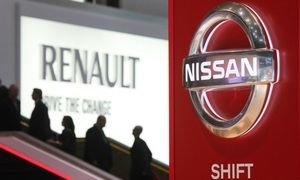For next Nissan CEO, priority is profit before Renault partnership

The next head of Nissan Motor Co will need to prioritize a recovery in profits at the troubled Japanese firm ahead of trying to fix its relationship with top shareholder Renault SA, executives and analysts say.
Reviving earnings would strengthen the carmaker's hand in negotiations with its French partner, and is something Renault itself would welcome as the owner of a 43.4% stake in Nissan.
Japan's second-largest automaker said on Monday CEO Hiroto Saikawa would step down on Sept. 16 after he admitted to being overpaid in breach of company rules.
It's another heavy blow for Nissan, which is already reeling from the arrest of former chairman Carlos Ghosn last year and a subsequent plunge in earnings. Its stock is down 20% this year.
For Saikawa's yet-to-be-named replacement, the top priority will be lifting profits from a more than decade low. Earnings have been undercut by years of heavy discounts and low-margin sales to rental firms that have cheapened Nissan's brand image.
Renault, which has unsuccessfully sought a full-blown merger with its larger partner, is likely to give the Japanese firm time to focus on its turnaround, a Nissan executive said.
"It goes without saying recovery is the biggest priority," the executive said, declining to be identified because the information is not public.
"We have Renault's understanding on that."
Tensions in the Nissan-Renault partnership worsened after Ghosn's arrest. He is awaiting trial in Tokyo on financial misconduct charges that he denies.
The strain has sparked investor concern about the future of the Franco-Japanese automaking alliance at a time when car companies desperately need scale to keep up with sweeping technological changes like electric vehicles and ride-hailing.
Nissan executives have long complained about their unequal partnership with Renault, which saved the Japanese firm from bankruptcy in 1999. Nissan holds a 15% stake in Renault, but without voting rights. Tokyo is also seen as being uneasy about the French government's 15% holding in Renault, which makes Paris an indirect shareholder in Nissan.
"Profitability is likely to remain under pressure and it (Nissan) is unlikely to promptly reach an agreement with Renault over the future shape of the alliance," analysts at Standard & Poor's said in a note.
Tensions worsened when Renault tried to in vain to merge with Nissan and then Fiat Chrysler. Both Renault Chairman Jean-Dominique Senard and the French government may now have to hold off on their expressed desire for stronger ties with Nissan.
"It's also in the French government's interest for Nissan to improve its bottom line," Janet Lewis, head of Asia transportation research at Macquarie Securities.
"Renault's share price is going to benefit much more from a healthy Nissan than any kind of merger agreement."
COO Yasuhiro Yamauchi will take over from Saikawa next week on an interim basis as a newly created nominations committee will recommend a successor by the end of October. Possible candidates include Nissan veteran Jun Seki, and Makoto Uchida, who currently head's the automaker's China operations.
Two key tasks for the new CEO will be to see through Nissan's recovery strategy in the United States, where it is trying to stop flooding the market with discounted cars, and execute plans announced by Saikawa in July to cut excess production at its global plants.
Saikawa on Monday suggested that his plan to improve U.S. profit by producing higher-quality cars while weaning dealers off of sales incentives was already paying off, and that signs of recovery would be evident at first-half results next month.
The new CEO will also oversee a cut of around one-tenth of Nissan's global workforce - its deepest job cuts since 2009 - and slash production capacity, shuttering underutilized plants built as part of Ghosn's aggressive growth strategy in 2011 to grab 8% global market share.
While steep, the challenges facing Nissan now are different from 1999, said Macquarie's Lewis, referring to the time when Renault rescued the automaker from the brink bankruptcy and dispatched Ghosn to overhaul the Japanese company.
"Nissan has a very strong balance sheet, it has a very profitable business in China. They have some problems in the U.S. but they're not insurmountable," she said.
"This is not a 1999 situation where Nissan needs to be rescued."
Related News
